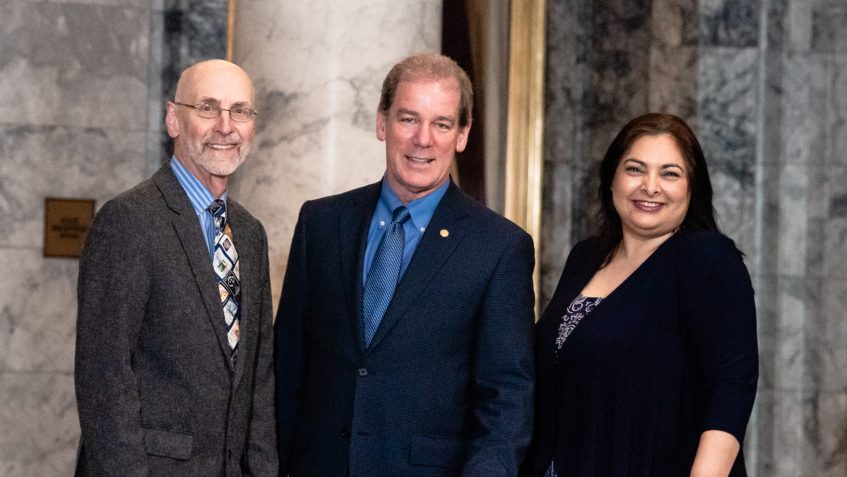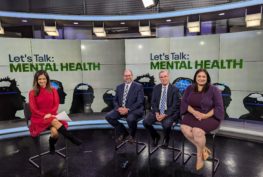From the Woodinville Weekly
As states around the country begin to ease off COVID-19 restrictions and allow people to go back to work, experts and officials express concern about the public health infrastructure needed to prevent a second wave of infections.
During a telephone town hall Thursday, May 7, state and federal lawmakers addressed concerns about the response to the virus outbreak.
Sen. Manka Dhingra (D-Redmond), Rep. Larry Springer (D-Kirkland) and Rep. Roger Goodman (D-Kirkland) partnered with U.S. Congresswoman Suzan DelBene and Ingrid Ulrey, policy director for Public Health, Seattle-King County, to address federal and statewide responses to the ongoing pandemic.
“This has been a trying time for our entire community in terms of making sure that folks are safe and healthy,” DelBene said. “The economic impact has already been devastating. We know that this is also an unpredictable time, so we’ve been working hard in Washington D.C. to provide support to help families.”
She said Congress has passed four bills so far to provide aid for small businesses, unemployed Americans and the healthcare system as hospitals surge at capacity.
Washington state, under the direction of Gov. Jay Inslee, has launched a four-phase approach to reopen businesses while taking effective precautions. Springer said Inslee’s first priority is to get the virus under control before focusing on the state’s economic recovery.
On the day of the call, Ulrey said there were 6,740 confirmed positive COVID-19 cases and 473 deaths in King County. Community mitigation measures and social distancing are essential to fight back against this virus, especially without a vaccine or cure, she added.
“By adhering to these measures, we’ve been very successful thus far in reducing the number of cases and reducing the number of deaths,” Ulrey said. “If we loosen up too quickly on the community mitigation, we will see a significant uptick in cases and deaths across the population.”
Contact tracing, which is used to break chains of transmission and prevent future surges of cases, has been a large topic of conversation to avoid a second wind of infections. DelBene said the act of contact tracing has prompted concerns about medical privacy and the protection of individuals who catch the virus.
“We absolutely need to use information to help fight this public health threat, but we also need to make sure that we protect people’s personal information,” she said. “And we can do both, but we’ve got to make sure we have clear privacy guidelines there.”
DelBene said contact tracing cannot happen without more testing. With shortages of product across the country, she said a constant and reliable supply is needed from a coordinated federal response before considering contact tracing. The same is true for personal protective equipment, she added.
“The virus is very skilled at finding new hosts and will continue to spread unless we can understand who is positive and ensure that those individuals are isolated,” Ulrey said.
In terms of a broad national contract tracing program, DelBene said the focus will be providing resources and guidance to states. According to Dhingra, Washington state is looking to hire 1,500 people to do contact tracing.
As children continue to learn from home, the public officials are addressing hunger relief and broadband access for working families to ensure basic needs are being met. Dhingra said farmers are donating produce that would otherwise go bad to fight food insecurity. Springer added that the legislature is working hard to create a statewide broadband policy, while also looking for innovative ways to put short-term measures in place.
There has been a spike in serious domestic violence due to the stay-at-home order. Goodman said King County has seen two murders in the last week, one attempted murder and one arson linked to domestic violence. So far, the county has had a 30% increase in domestic violence at both the felony and misdemeanor levels.
Goodman said he has been monitoring detention facilities, adult jails and prisons, and juvenile detention facilities across the state. There is no evidence of the virus in the juvenile system, although one staff member at a juvenile rehabilitation facility tested positive and has been isolated.
Monroe Correctional Complex is the only adult residence with positive cases and all 18 prisoners, who were located in the same unit, have been isolated. Goodman said there has been strict screening, quarantining and isolating for the incarcerated population.
“That’s only 0.1% of the entire prison population, which is remarkable given the congregated living circumstances compared to homeless shelters or housing for migrant labor and foreign labor,” Goodman said.
He said those who are not a threat to the public are being treated in the community rather than being incarcerated, signaling a potential shift in the system of criminal accountability.
The 45th Legislative District extends through Woodinville, Duvall, Kirkland, Redmond and Sammamish. DelBene represents the 1st Congressional District, which extends from northeastern King County to the Canadian border.
By Madeline Coats




